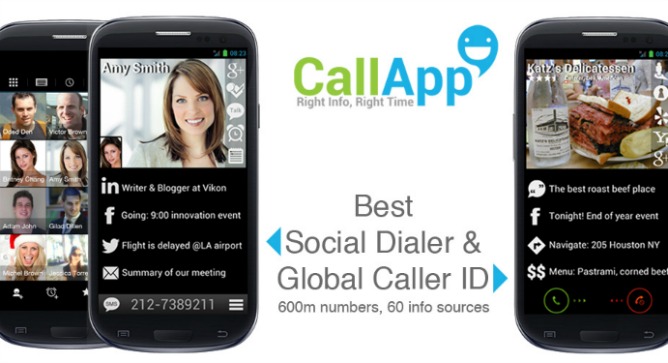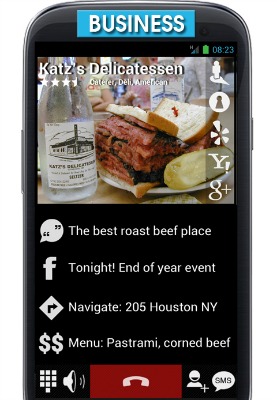Mi ze? (“Who is this?”) asked Oded Volovitz, the CEO of CallApp, when ISRAEL21c cold-called him recently.
The tech tastemaker site TechCrunch touts CallApp as a disruptive technology, and if Volovitz has his way, his company will become the Wikipedia of phone calls.
Spread the Word
• Email this article to friends or colleagues
• Share this article on Facebook or Twitter
• Write about and link to this article on your blog
• Local relevancy? Send this article to your local press
He didn’t recognize my writer’s contacts using an unblocked cell phone number, yet Volovitz was able to send ISRAEL21c an impressive screenshot of my personal and professional data: Facebook pictures, email contacts, mutual friends, plus what apps are being used.
All this info was emailed to him automatically via CallApp after it scoured the Web using a single telephone number — a single but important bit of the billions of bits of contact data items “out there” about us on the Internet.
“Our system works using a probability mechanism,” says Volovitz. “It tries to access information from Facebook, Linked In, and to find our mutual friends. If the app finds we have 10 mutual friends, it will say, well this is probably her calling.”
CallApp connects with about 50 sources of information to deliver a real-time backgrounder on anyone who calls you or anyone you call, if the information is available.
While it might sound disarming to know that a caller can get this information real-time, it is not uncommon for people to “Google” callers anyway. CallApp just does the search and background checks automatically. You can decide when, and if, to pick up.
Is it another telemarketing call from a switchboard in India? Or a crank? Is this an important business colleague I should not keep waiting? Or a cousin from Idaho I want to avoid at all cost? These are the questions we have to ask before we answer a call from a number that is not already in our contacts database.
“There are so many different ways CallApp can figure out who is the right person. We provide information from one billion phones from 60 different sources,” says Volovitz. “We take the info from trusted sources.”
No more cranks calls for pizzas
As more and more contacts — personal, business and everything else – get stored on the Internet, CallApp plans to cut down on the clutter.
It is a free and downloadable app for Android, and the iPhone version will be ready in several months, says Volovitz.
It works in reverse too, and this essentially is the way that CallApp intends to make money, since the app is free. If you are ordering sushi from an unknown address, CallApp provides you with a Google map, clickable coupons and a menu, and even a taxi to get there if need be.
“Think of yourself calling your favorite restaurant: We can make money if you use a coupon; if you take a taxi there, we can make money. If you like us on Facebook, we can make money.
CallApp has been designed so it does not consume an exorbitant amount of battery. The first time a user signs in, however, it will take about 10 minutes to sync phone data with the system.
“We do some of the things when connected to the target, and other things we do lean and efficiently,” promises Volovitz.
From then on, contacts related to you will be pulled from a cloud-based system that syncs occasionally. It also integrates with other calling apps like Fring, Skype or WhatsApp.
As a tech company, CallApp, a company of 10 founded in Tel Aviv in 2011, plans to remain a tech company. They will sign deals as a third-party networker, with companies like GetTaxi or Open Table, to garner a percentage of revenue that these services collect for ordering a table or ordering a taxi over an app on your phone.
Several hundred thousand people are already signed on to CallApp and it’s become very successful in terms of how often it’s used. “Every user is opening it on average 600 times a month – more than any mobile app, and that’s four times more than Facebook. This is what makes us special,” says Volovitz.
“We plan to be the best search engine for people and services,” Volovitz concludes with all the confidence of a young Tel Avivian startup hopeful.
CallApp has a seed investment of $1 million. They will open a first round in a couple of months.

















